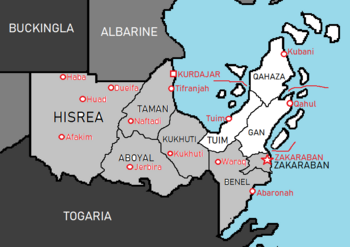People's Republic of Qahaza
People's Republic of Qahaza Qahazar | |
|---|---|
|
PRQ flag | |
 Qahazar (white) at its largest extent (November 2023) | |
| Status |
|
| Capital | Kubani |
| Largest city | Qahul |
| Government | Militant autonomous region |
• Chairman | Suhaib el-Dar Moussa |
• Regional administrator | Awni el-Hameed |
| Population | |
• 2023 estimate | 8,047,969 |
The People's Republic of Qahaza, abbreviated as the PRQ and also known as Qahazar, was a self-declared autonomous entity within Zalluabed, which comprised of the Qahazi Peninsula and the provinces of Qahaza, Gan, and Tuim. The capital and administrative center was Kubani, the largest city was Qahul, and other major cities included Tuim, Boraeere, Toutmoul, and El Tuentis. The PRQ was established during the Zalluabed civil war on November 28th, 2023, when former-Zalluabedi general Suhaib el-Dar Moussa and the regional governors of the aforementioned provinces declared their separation from the executive government in Zakaraban. Days prior, el-Dar Moussa's Kubani Unit carried out drone attacks on Albarinean and Emmirian ports on the Tarijar Strait. This prompted Zalluabed's interim-president Jirhanu Bjyala to strip Moussa's military command over concerns that WEDA and the ANS would retaliate, which they did in Operation Afton. Following a CCA-mandated ceasefire between Zakaraban and Feyt Ayat, the two factions focused their military attention on Qahazar, and gradually el-Dar Moussa's forces began to crumble. The Tuim Accords in July 2024 resulted in Anyuaa's independence, part of the settlement of which meant their military operations would cease in Qahazar. By mid-July 2024, PRQ holdouts were limited to small pockets in Kubani and Toutmoul.
Internationally, Qahazar's status was disputed. It was recognized as Zalluabedi territory by most countries, including its foes, due to the controversial standing of el-Dar Moussa and his forces. Additionally, reported persecution of Qahazi Catholics, Batnas, and local Hisrean communities by the Kubani Unit, including mass killings, have been considered a genocide by the Coalition of Crown Albatross' human rights groups.